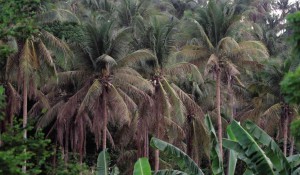LOS BAÑOS, Laguna, Philippines — Scientists from the University of the Philippines Los Baños (UPLB) and a group of coconut industry stakeholders said the government would no longer need to inject insecticides to coconut trees infested by coconut scale insects (CSI) after discovering the presence of parasitoids that could naturally end the ‘cocolisap’ outbreak.
The Comperiella sp (Encytidae, Hymenoptera) is an insect native to the Philippines and a “natural enemy” of CSI, locally referred to as cocolisap.
The parasitoid, described like a wasp and a relative of bees, punctures the scale of cocolisap and deposits its eggs into the host insect. The parasitoid’s larvae feed on the CSI’s internal tissues until the host dies in a process that takes about 25 days.
The presence of this parasitoid in coconut trees was first discovered by UPLB entomologists Mario and Marcela Navasero in a farm in San Pablo City, Laguna, in March.
In a press conference called by the nongovernment Save the Coconut Movement (SCM) Monday, the Navasero couple along with another UPLB scientist, Dr. Ted Mendoza, announced their findings, seen to bring hope for an end to an outbreak that has so far affected 2.1 million coconut trees, mostly in Calabarzon (Cavite, Laguna, Batangas, Rizal, Quezon).
“Definitely, a good news to our farmers,” Mario said in a phone interview.
Mario said more than 80 percent of coconut trees in Batangas and more than 60 percent in Laguna have shown signs of recovery from the outbreak.
A coconut tree grows one leaf per month and since the trees have now grown about 12 green leaves (from just about one to two leaves at the height of the outbreak), the parasitoids must have naturally started growing in number since 2013, Mario said.
The cocolisap (Aspiodotus rigidus), first detected in Batangas province in 2009, causes the leaves to dry up and turn brown before the coconut tree withers away.
“We’ve been recommending to the PCA (Philippine Coconut Authority) to find these natural enemies but they were telling us they couldn’t find any,” Mario said.
In June, President Aquino allotted P70 million for a program to contain CSI, first reported on Sangi Island, Indonesia, in the 1920s.
The PCA has approved the trunk injection of neocotinoids to the infested trees.
“There is therefore no more need for neocotinoids, which is basically injecting poison into our source of food. It’s also just a waste of public funds,” said SCM president Rene Pamintuan.
According to Mario, neocotinoids have toxic effects on bees and might disrupt nature’s balance once applied to areas where there is already the presence of the parasitoids.
Signs of recovery, he said, were signals that the outbreak, now on its fifth year, has started nearing its natural end.


